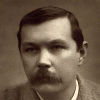“ True forethought only arises when a man does something towards which no impulse urges him, because his reason tells him that he will profit by it at some future date. ”
Bertrand Russell, A History of Western Philosophy (1945). copy citation
| Author | Bertrand Russell |
|---|---|
| Source | A History of Western Philosophy |
| Topic | future profit |
| Date | 1945 |
| Language | English |
| Reference | |
| Note | |
| Weblink | http://www.ntslibrary.com/PDF%20Books/History%20of%20Western%20Philosoph... |
Context
“no animal and no savage would work in the spring in order to have food next winter, except for a few purely instinctive forms of action, such as bees making honey or squirrels burying nuts. In these cases, there is no forethought; there is a direct impulse to an act which, to the human spectator, is obviously going to prove useful later on. True forethought only arises when a man does something towards which no impulse urges him, because his reason tells him that he will profit by it at some future date. Hunting requires no forethought, because it is pleasurable; but tilling the soil is labour, and cannot be done from spontaneous impulse.
Civilization checks impulse not only through forethought, which is a self-administered check, but also through law, custom, and religion.”
source


